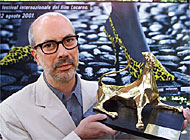Locarno film festival ends in disagreement

Controversy marked the end of the Locarno film festival on Sunday, with boos greeting the announcement by the official jury that this year's top award, the Golden Leopard, had been given to the Italian production "Alla rivoluzione sulla due cavalli" (To the revolution by 2CV), directed by Maurizio Sciarra.
In a move unprecedented in the festival’s 54-year old history, two members of the eight-person jury read out a statement at the press conference where the announcement was made dissociating themselves from the decision taken by the majority of their colleagues.
The prominent Italian film actress, Laura Morante, and a French film director, Emilie Deleuze, said they didn’t support the majority decision. “In our view, ‘Delbaran’ (by the Iranian director, Abolfazl Jalili) should have received the award for best film,” they said.
The winning film is a road movie about the trip of Marco and Victor, two students in Paris and best friends, who drive to Victor’s native Portugal in a banged-up Citroen 2CV, following the “revolution of carnations” that toppled Portugal’s military dictatorship on 25 April, 1974.
“Alla Rivoluzione sulla due Cavalli” flows pleasantly, especially with its soundtrack of 1970s hits. When it was screened earlier in the week, it was well-liked by critics and the public, especially by left-leaning liberals of a generation over 40 who recall the 1974 revolution in Portugal as vividly as the film’s director, Sciarra, must have done.
Winner takes second award
“Alla Rivoluzione sulla due Cavalli” received another award, the Bronze Leopard for best actor. It went to Andoni Gracia, who plays Victor. The leopard for best actress went to Kim Ho-Jung who led the cast in the South Korean production, “Nabi”.
The two silver leopards for best young and new films went to Alain Gomis, an African French, for “L’Afrance”, and Peter Sehr, a German working in the United States, for “Love the Hard Way”.
The Golden Leopard brings with it prize money of SFr40, 000; the silver awards are worth SFr20, 000. The bronze is a distinction.
There were no prizes for the two Swiss entries in the competition, “Happiness Is a Warm Gun” by Thomas Imbach and “Scheherazade” by Riccardo Signorell.
There had been rumours after the jury’s final deliberations on Saturday that the jury president, New York Times film critic Janet Maslin, had to cast a deciding vote in a hung jury (the ninth member cancelled his visit to Locarno shortly before the start of the festival). But Maslin denied the rumours.
“Too nostalgic”
But the film was never a favourite, proving too nostalgic in tone for many critics and viewers.
At the end of the film, for example, Victor, Marco and Claire, a former girlfriend of Marco’s who is picked up during the trip, are looking for revolutionaries on the streets of Lisbon, but find only flag-waving football fans. The film, which is set on three very specific days in April, also has serious flaws, such as squares with their trees in full autumn colours.
Almost all the other films in the competition deal not in the past like the winner, but rather in the present and, in one case, the future.
Most European films in the competition were “psychological” tales. They deal with death, love and happiness – but prefer doing so in an indirect rather than a blunt way, by describing the feelings and conflicts caused in individuals and in their relationships.
The selection of the 19 films in the competition was also noteworthy for the recurrent theme of children. “Non è giusto” (It’s not right) by Italian director Antonietta De Lillo is about a boy and a girl, both eight-years-old, whose parents’ marriages break up and who discover their own emotional world.
Praise for festival director
Two films, “Le lait de la tendresse humaine” (The milk of human kindness) by the French director, Dominique Cabrera, and “Ich werde dich auf Händen tragen” (I will carry you on my hands) by Germany-based Scotsman Iain Dilthey, respectively explore the “hatred” mothers can feel for their children in a post-natal trauma and how they can feel outcasts in their own families.
Another recurrent theme, featured in mostly non-European films at Locarno was about the loss and discovery of cultural identity. “Delbaran”, the film favoured by the minority on the jury, describes the life of an Afghan boy refugee in Iran and his quest for an existence.
Once the dust has settled over the split in the jury, the 54th Locarno film festival will be remembered as a good edition, albeit one that lacked any truly outstanding films.
Irene Bignardi, the festival’s new artistic director, received praise for her selection of films for the official competition, as well as in the sections for up-and-coming directors, the more popular, commercial Piazza Grande section, and retrospectives.
by Markus Haefliger

In compliance with the JTI standards
More: SWI swissinfo.ch certified by the Journalism Trust Initiative
You can find an overview of ongoing debates with our journalists here . Please join us!
If you want to start a conversation about a topic raised in this article or want to report factual errors, email us at english@swissinfo.ch.